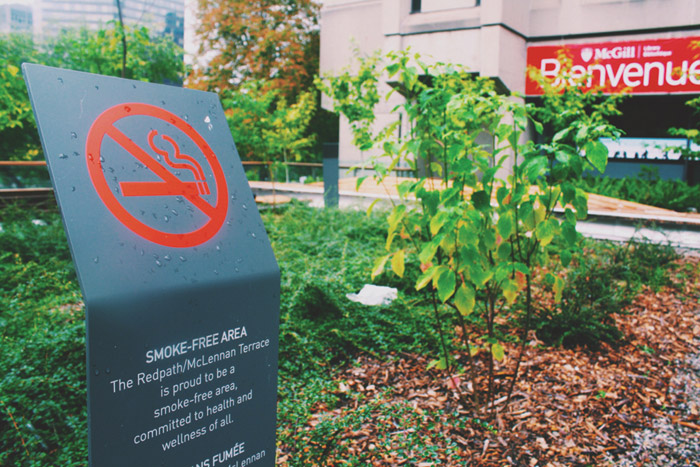McGill’s new smoking policy, set to come into effect on May 1, prohibits smoking on both the Downtown and Macdonald campuses outside of newly designated smoking areas. These areas will be gradually phased out over the next five years and, with the exception of permanent smoking areas near the upper residences and Solin Hall, the Downtown campus will become entirely smoke-free in 2023.
On the Downtown campus, six smoking areas will be designated behind the James Administration building, east of Morrice Hall, near Burnside Hall, near the McIntyre Medical building, near the upper residences, and outside of Solin Hall. At the Macdonald Campus and the Gault Reserve, smoking areas have not yet been designated.
The McGill Medical Students’ Society began exploring the idea of McGill’s Downtown campus becoming entirely smoke-free in 2015. In 2016, the Students’ Society of McGill University (SSMU) and the Post-Graduate Students’ Society of McGill University (PGSS) held separate online referenda regarding the idea, garnering support from 73 and 77 per cent of their student bodies, respectively. SSMU then drafted a smoke-free policy and submitted it to the University for consideration.
The University Health and Safety Committee endorsed plans for a smoke-free campus in January 2017, and McGill’s Board of Governors subsequently adopted the new Policy Concerning Smoking at McGill University on Dec. 12, 2017. In an email circulated to the entire student body on Jan. 29, the McGill administration described its plans for enforcing the new smoking spaces.
“These areas will be identified by signage, and people smoking elsewhere on campus other than in these areas will be respectfully asked to smoke either in one of the designated areas or on a public street,” the Media Relations Office wrote in the email.
The Quebec Ministry of Health and Human Services is supportive of the transition. In an email to the The McGill Tribune, Marie-Claude Lacasse, a public relations representative for the ministry, explained the benefits of a gradual transition to a smoke-free campus.
“In regards to the step-by-step approach, public health is in favor of this approach, since it allows the support of students, teachers, and all staff,” Lacasse said. “[However] institutional policy should ideally be more comprehensive than just a ban on smoking, including the promotion of smoking cessation and non-smoking promotion services.”
The smoking ban will not be enforced along McTavish street as it is under the jurisdiction of Montreal’s municipal government. In an interview with the Tribune, Associate Vice-Principal Facilities Management and Ancillary Services Robert Couvrette, who has led much of the negotiations over the smoking policy, acknowledged the importance of the policy despite the difficulties it may pose.
“No-smoking rules are unfortunately difficult to enforce,” Couvrette said. “We must rely on the thoughtfulness, consideration, and cooperation of individuals.”
In addition, some students have raised concerns over how the new policy will affect those who smoke as a coping mechanism for stress and anxiety. SSMU Mental Health Commissioner Ebby Crowe explained that there can be a correlation between the two in an interview with the Tribune.
“If you’re pulling an all-nighter in the library, you’re already dealing with feelings of isolation, your stress is high because you’re in the middle of studying for exams, [and so] taking a smoke break […] offers you the opportunity to go outside, get away, [and get] the opportunity to interact with your peers,” Crowe said. “We may see an increase in students going to seek out counselling or psychiatric services [after the ban].”
However, Crowe maintained that, in the long-run, a gradually-implemented policy will be beneficial to students’ physical health and will soften the transition to a smoke-free campus.
“It’s going to frustrate a lot of students but long-term, the mental health and physical health benefits, I think, definitely outweigh the inconvenience,” Crowe said. “If we are promoting smoke free environments, eventually it is going to make it easier for students to quit.”









